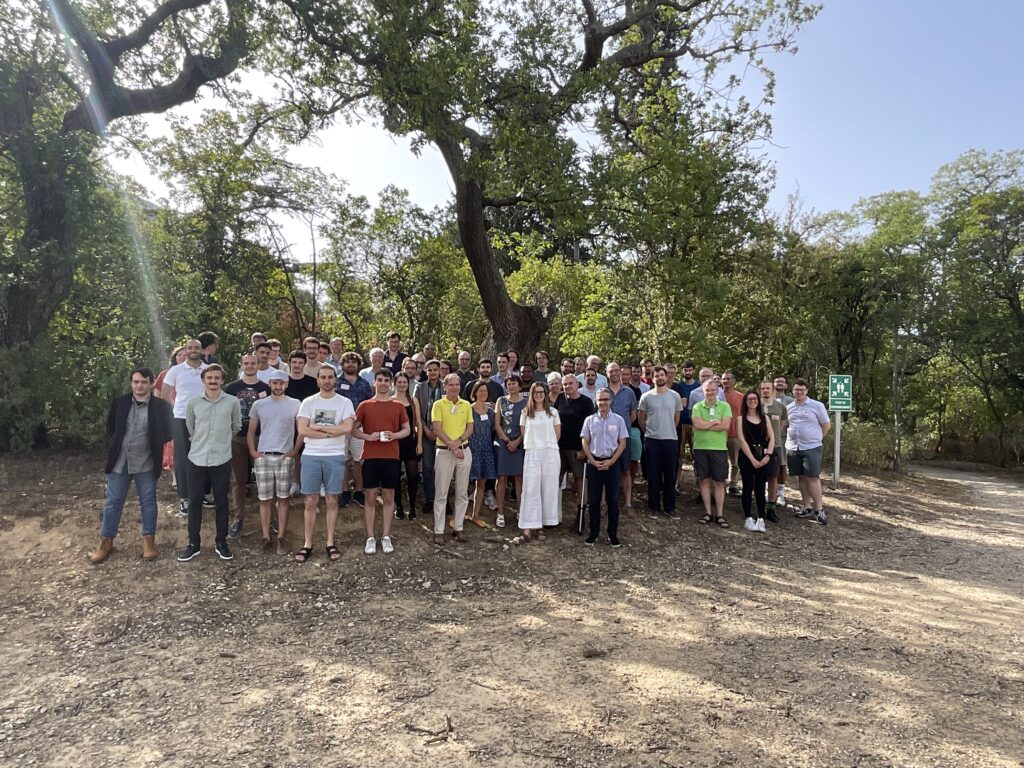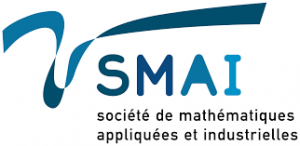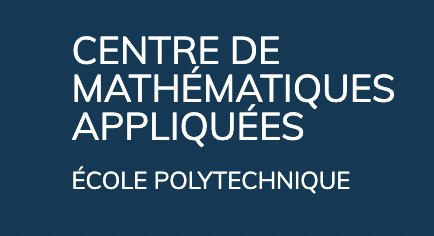CONFERENCE
A Random Walk in the Land of Stochastic Analysis and Numerical Probability
Une marche aléatoire dans l’analyse stochastique et les probabilités numériques
4 – 8 September 2023
Scientific Committee
Comité scientifique
Nicolas Champagnat (Centre Inria Nancy – Grand Est)
Sylvie Méléard (École polytechnique)
Gilles Pagès (Sorbonne Université)
Philippe Protter (Columbia University)
Étienne Tanré (Centre Inria d’Université Côte d’Azur)
Milica Tomašević (CNRS, École polytechnique)
Organizing Committee
Comité d’organisation
Nicolas Champagnat (Centre Inria Nancy – Grand Est)
Gilles Pagès (Sorbonne Université)
Étienne Tanré (Centre Inria d’Université Côte d’Azur)
Milica Tomašević (CNRS, École polytechnique)
The purpose of the conference is to bring together leading researchers and students in stochastic analysis and numerical probability and to discuss new results and research challenges. The emphasis will be put on the links between stochastic analysis and linear and non-linear partial differential equations and on the analysis and simulation of non-linear or singular stochastic models, with application topics ranging from finance to biology and physics. The mathematical topics of the conference include propagation of chaos and long-time stochastic and numerical analysis of McKean-Vlasov particle systems, stochastic control and mean-field games, (martingale) optimal transport, discretization schemes for degenerate or singular stochastic differential equations, Monte Carlo methods and stochastic optimization. A particular interest will be put on singularity in stochastic models, which may appear for example in specific boundary or transmission conditions or in particular interactions in particle systems. Physical particle systems with singular interactions are relevant in fluid dynamics, neurosciences or population dynamics and cell motion (for example in Keller-Segel equation). Singular transmission conditions occur in geosciences or in molecular dynamics. Risk analysis, stochastic control and mean-field games are of great interest in Finance. Part of the speakers will be non-academic researchers and industrial partners. This conference is organized in the honor of Prof. Denis Talay. It will cover an important part of the topics of his outstanding scientific contributions and bring together many of his friends and colleagues.
Cette conférence réunira les meilleurs chercheurs et étudiants spécialistes en analyse stochastique et en probabilité numérique. Ils présenteront leurs résultats récents et nous discuterons des challenges actuels dans ces domaines. Les liens entre analyse stochastique et équations aux dérivées partielles (linéaires et non linéaires) seront centraux. Nous nous intéresserons également à l’analyse de modèles stochastiques non linéaires ou singuliers dont les applications sont nombreuses, aussi bien en finance, en biologie qu’en physique. Parmi les thèmes de la conférence : la propagation du chaos, l’analyse (stochastique et numérique) du comportement asymptotique en temps long des systèmes de particules en interaction (équations de McKean-Vlasov), le contrôle stochastique et les jeux du champ moyen, le transport (martingale) optimal, les schémas de discrétisation pour des EDS dégénérées, les méthodes de Monte Carlo et l’optimisation stochastique. En particulier, nous aborderons les modèles stochastiques singuliers, avec par exemple des conditions au bord spécifiques, des conditions de transmission, ou des interactions singulières dans les systèmes de particules. Ces modèles de systèmes de particules avec des interactions singulières sont utilisés fréquemment en dynamique des fluides, en neurosciences, en dynamique des populations et pour modéliser des déplacements de cellule (par exemple dans l’équation de Keller-Segel). Les conditions de transmission singulières apparaissent en géoscience et en dynamique moléculaire. L’analyse des risques, le contrôle stochastique et les jeux de champs moyens sont omniprésents en finance. Cette conférence est organisée en l’honneur de Denis Talay. Elle abordera une partie importante des thèmes issus de ses contributions scientifiques remarquables. Elle réunira aussi ses amis et collègues.
SPEAKERS
Vlad Bally (Université Paris-Est Créteil Val de Marne) Construction of Boltzmann and McKean Vlasov type flows (the sewing lemma approach)
Christophette Blanchet-Scalliet (École Centrale de Lyon) Gambling for resurrection and the heat equation on a triangle
Nicolas Champagnat (Centre Inria Nancy – Grand Est) Wasserstein convergence of penalized Markov processes
Julien Claisse (Université Paris Dauphine-PSL) Mean-field Optimization regularized by Fisher Information
Quentin Cormier (Centre Inria de Saclay) Stability and metastability in mean-field equations
François Delarue (Université Côte d’Azur) Rearranged stochastic heat equation
Nicole El Karoui (École polytechnique) Forward Convex random fields with Applications to Convex pricing
Olivier Faugeras (Centre Inria d’Université Côte d’Azur) Two examples of thermodynamic limits in neuroscience
Nicolas Fournier (Sorbonne Université) Systèmes de particules pour l’équation de Keller-Segel dans le plan
Emmanuel Gobet (École polytechnique) Walking forward and backward in Euler schemes and random number generators
Carl Graham (CNRS, École polytechnique) Perfect simulation of the invariant laws of Markovian load-balancing queueing networks
Jean-François Jabir (National Research University Higher School of Economics) A Kramer’s type law for the first collision-time of two self-stabilizing diffusions
Jean Jacod (Sorbonne Université) Systematic Jump Risk
Benjamin Jourdain (École des Ponts ParisTech) Convergence rate of the Euler-Maruyama scheme applied to diffusion processes with Lq − Lp drift coefficient and additive noise
Damien Lamberton (Université Paris-Est Créteil Val de Marne) Regularity results in optimal stopping: a probabilistic approach
Bernard Lapeyre (École des Ponts ParisTech) How many inner simulations to compute conditional expectations with least-square Monte Carlo?
Antoine Lejay (Centre Inria Nancy – Grand Est) Walking in abrupt lands
Pierre-Louis Lions (Collège de France) Large Random Matrices and PDE’s
Eva Löcherbach (Université Paris 1 Panthéon-Sorbonne) Conditional propagation of chaos for generalized Hawkes processes having alpha-stable jump heights
Miguel Martinez (Université Gustave Eiffel) An introduction to the pseudo skew Brownian motion
Sylvie Méléard (École polytechnique) Exponent dynamics for branching processes
Stéphane Menozzi (Université d’Évry) Multidimensional Stable driven McKean-Vlasov SDEs with distributional interaction kernel: existence, uniqueness and propagation of chaos
Gilles Pagès (Sorbonne Université) Functional convex order for stochastic processes: a constructive (and simulable) approach
Fabien Panloup (Université d’Angers) Asymptotically unbiased approximation of the QSD of diffusion processes
Étienne Pardoux (Aix-Marseille Université) Recent results on epidemic models
Olivier Pironneau (Sorbonne Université) Numerical Analysis Of Degenerate Kolmogorov Equations of Constrained Stochastic Hamiltonian Systems
Philip Protter (Columbia University) The Cox Construction of Stopping Times and Markov Processes
Alexandre Richard (Université Paris-Saclay) Regularisation by noise for SDEs driven by fractional Brownian motion
Benoîte de Saporta (Université de Montpellier) Stochastic control for medical treatment optimization
Étienne Tanré (Centre Inria d’Université Côte d’Azur) Synchronization detection by permutation test
Milica Tomašević (CNRS, École polytechnique) Propagation of chaos for stochastic particle systems with singular mean-field interaction of Lq − Lp type











